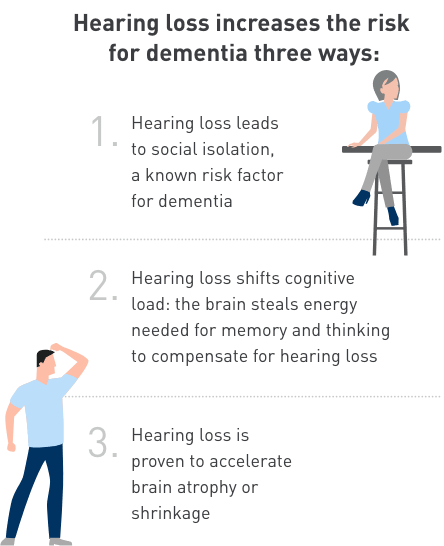Hearing Loss
What is hearing loss?
Hearing loss is the reduction in our ability to hear certain sounds and affects 750 million adults worldwide. Because it is gradual, it’s important to be aware of hearing loss signs.

Types of hearing loss
There are three types of hearing loss — sensorineural hearing loss, conductive hearing loss, and mixed hearing loss.
Sensorineural hearing loss
Sensorineural hearing loss is the most common type of hearing loss. It occurs when the inner ear nerves and hair cells are damaged — perhaps due to age, noise damage or something else. Sensorineural hearing loss impacts the pathways from your inner ear to your brain. Most times, sensorineural hearing loss cannot be corrected medically or surgically, but can be treated and helped with the use of hearing aids.
Conductive hearing loss
Conductive hearing loss is typically the result of obstructions in the outer or middle ear — perhaps due to fluid, tumors, earwax or even ear formation. This obstruction prevents sound from getting to the inner ear. Conductive hearing loss can often be treated surgically or with medicine.
Mixed hearing loss
Mixed hearing loss is just what it sounds like — a combination of sensorineural and conductive hearing loss.
As with any medical condition, it’s best to know what you “have” before deciding what to do about it. A consultation with a hearing professional can help determine the type, cause and degree of your hearing loss.
Degrees of hearing loss
There are four clinically labeled degrees of hearing loss:
- Mild – if you have mild hearing loss, you may hear some speech sounds, but will have difficulty with soft sounds.
- Moderate – if you have moderate hearing loss, you’ll struggle to hear and/or understand speech when someone is talking at a normal level.
- Severe – If you have severe hearing loss, you will hear little-to-no speech when spoken at normal levels and hear only some loud sounds.
- Profound – if you have profound hearing loss, you may only hear very loud sounds and no speech at all.
Causes of hearing loss
Hearing loss is caused by many factors, most frequently from natural aging or exposure to noise. The most common causes of haring loss are:
The good news is that 90-95% of people with hearing loss can be treated with hearing aids.
Reasons to get help
Hearing loss plays a significant role in many issues that impact our quality of life.
Hearing loss impacts emotional well-being
With healthy hearing, you can easily take in sounds like laughter, music, nature or conversations with family and friends. Hearing these sounds helps make moments more memorable and life more enjoyable.
When hearing is impaired, those important sounds slowly fade – leading to changes that impact emotional health.
- Hearing loss might cause embarrassment
- Missing favorite sounds might lead to sadness
- Missing critical information could create anxiety
- Not hearing conversations clearly might lead to feeling left out
- And feeling left out can lead to social isolation or depression
Hearing loss impacts both physical and mental health
A growing body of research links hearing loss to dementia and cognitive decline. When you hear your best, it’s easy to stay engaged, alert and active.
When hearing is impaired, your sense of space shrinks, warning cues get missed, and you withdraw from social activities or situations. This leaves your physical and mental health vulnerable.
- Adults with hearing loss are up to 5 times more likely to develop dementia1
- Hearing loss is linked to a three-fold risk of falling1
- Accidental injuries are up to 50 percent more likely for people with hearing loss2
1 Johns Hopkins Medicine
2 JAMA Otolaryngology-Head & Neck Surgery

Treating hearing loss makes life better
Taking that important step and getting treatment for hearing loss with hearing aids is known to provide valuable benefits and improve quality of life. It’s an easy step to take and often leaves the first-time hearing aid wearer asking, “why didn’t I do this sooner?”
Treatment of hearing loss has been shown to improve
- Communication in relationships
- Intimacy and warmth with family relationships
- Ease in communication
- Earning power
- Sense of control over your life
- Social participation
- Emotional stability

